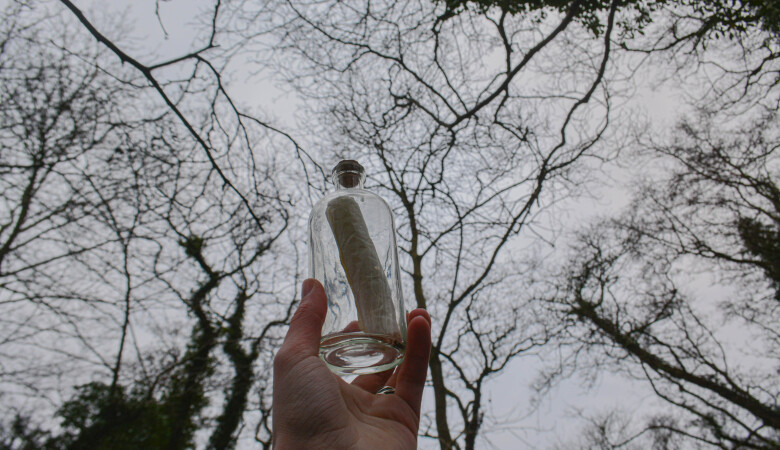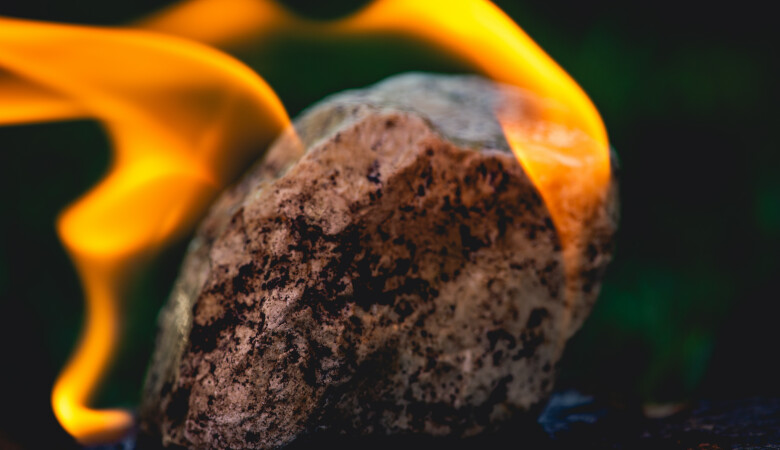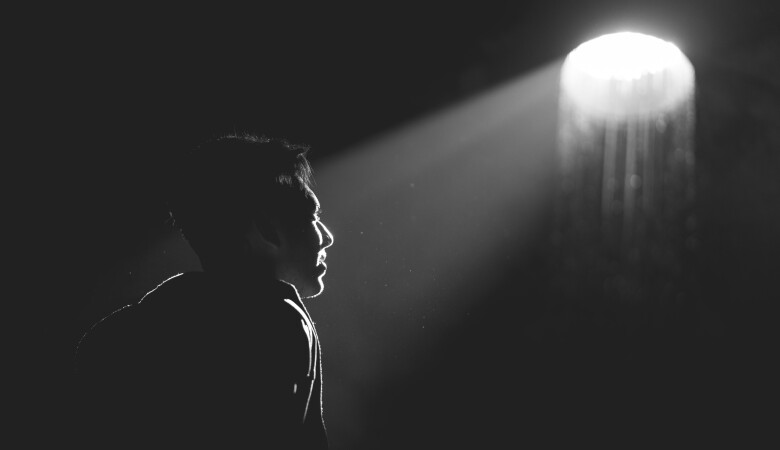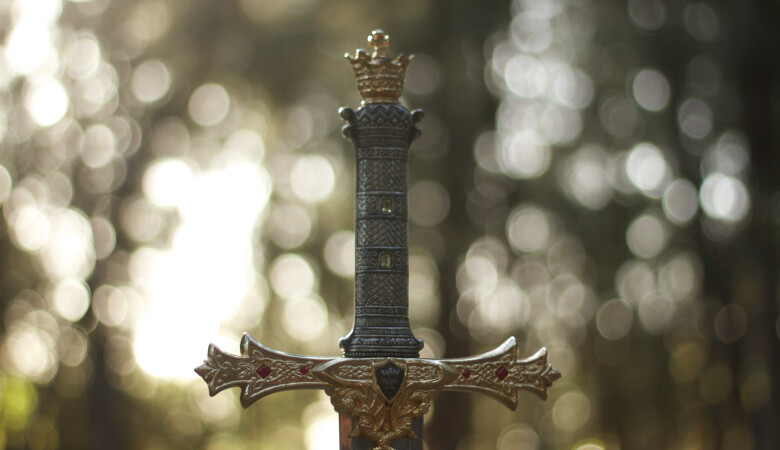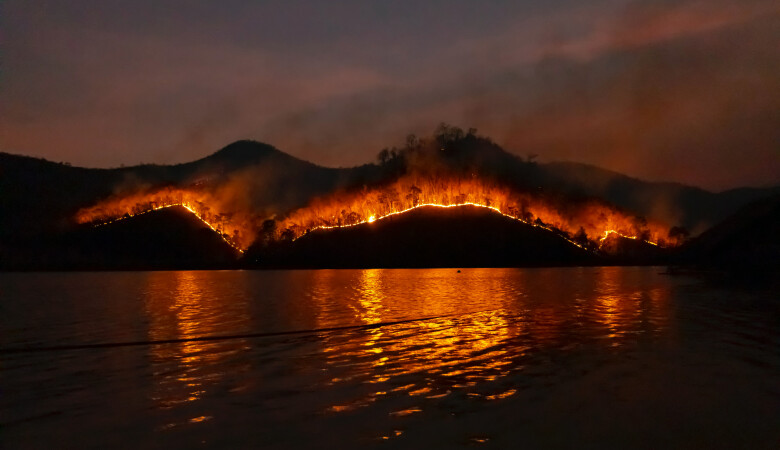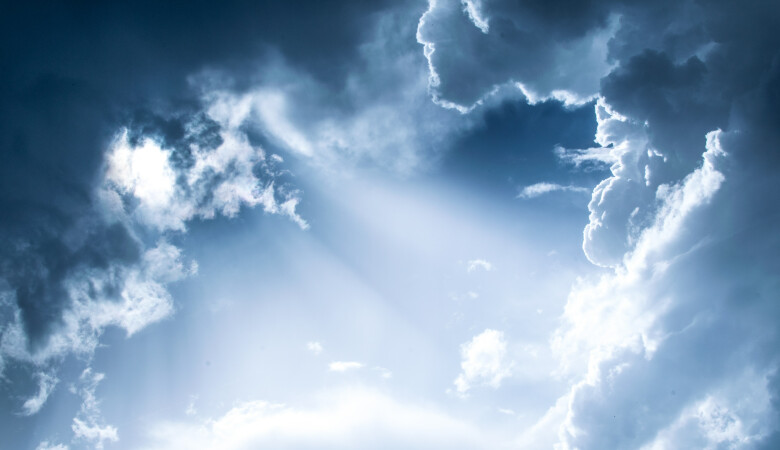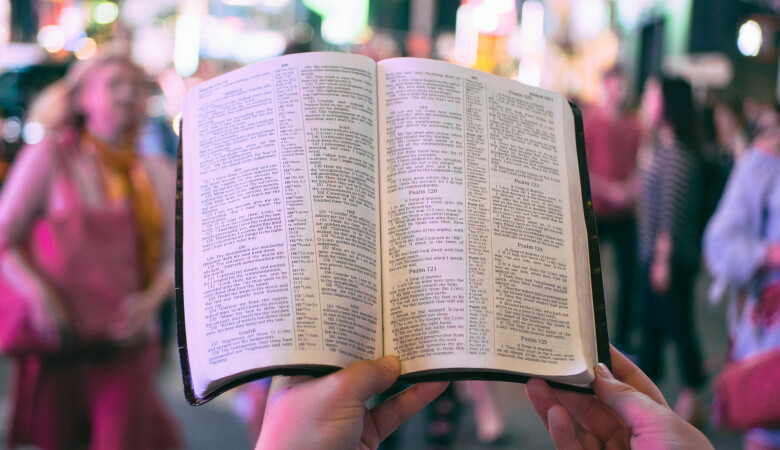The Life of Elijah - Week 14
October 13, 2002 | Andy Davis
2 Kings 2:8-18
Courage
Pastor Andy Davis preaches an expository sermon on portions of 1 & 2 Kings. The main subjects of the sermon are the lessons we can learn from the life of Elijah.
- SERMON TRANSCRIPT -
Now we're going to look to scripture and I'd like to finish up our study in the life of Elijah, and I was contemplating going on to something different at this point, but I just thought, you know, we've been through a lot of different messages in the life of Elijah and I thought it would be of some benefit to go back and to just summarize and to look and probably draw out some lessons from the life of Elijah and also see Elijah in prophetic perspective, also the connection over into the New Testament. So, that's what we're going to do with our time. And it was just incredible for me to look over just the events of this man's life. What an incredible life when you stop and think about it. He appears out of nowhere to the mighty king, Ahab, the wicked king, and says, "As the Lord lives, as surely as the Lord lives, there'll be neither rain nor dew except at my word," and then he disappears. Now, incredible boldness, out of nowhere appears, and you know that before that there had been preparation, prayer, he's praying back the covenant of Moses back to God in which God had promised to do this very thing in which He said, "I'll turn the sky above you bronze and the ground beneath you will be iron if you break my covenant." In other words, that's a clear prophecy of drought and of famine, and Elijah prayed for it to happen. What an incredible man of God this was. But he prayed earnestly it says in the book of James that it would not rain, and it didn't, and all of this for the glory of God.
And then he is led by God to the brook, Cherith, where he is provided for with ravens as they bring him little bits of food and a little bit at a time, a little bit at a time. How much can a raven carry? I don't think that they could get the whole meal all at once, but little at a time, and that's just a picture of God's faithful provision to his prophet. And what did he do all the time before the brook dried up? He must have been praying and seeking the face of God and earnestly praying for his people. And then the brook dried up and God led him to a widow at Zarephath, and he had to travel across a desert, just by faith that there'd be somebody there to provide for him. “I have commanded someone to care for you.” And he goes and sees a woman collecting sticks, you remember? And he goes up and says, "Can you give me a little something to drink?" And that was like gold, I'm sure at that point, but she managed to find him a little drink and then he said, "Would you mind baking me a cake?" And she said, "You don't understand. We have a tiny bit of flour and a little bit of oil left. I was going to bake some cakes for my son and for me and then we were going to die." In other words, there's nothing left after that, and it's all gone. Everybody around us is starving. And he said, "Please bake the cake for me anyway and God will provide." And so, the woman shows her faith, does it, and then God provides. Day by day, little bit at a time, just enough flour, just enough oil, just enough day after day to eat and to stay alive.
Meanwhile, what did he do the whole time? I'm thinking about Elijah's life. It doesn't say much. I don't know if he was a reader or what he did with all his time. I figure he couldn't go out of doors much because that was Jezebel's home area, and so, he was in hiding, and so, he must have just been spending his time as a man of God in prayer for his people. Incredible development of his spiritual life, but he's praying and seeking God. Of course, you remember that the widow's son dies at one point and she's very distraught and very insulting to the prophet and says, "You've come to bring trouble on us," and he prays that God would raise this little boy from the dead, and God does raise him from the dead. What an incredible thing that God would raise the dead at the word of a man, and so, he does. And then after that, God leads him and specifically says, "Go back, I want you to confront Ahab," and he goes back and he meets up with a servant of God named Obadiah. You remember that Obadiah was a man who had hid some prophets of the Lord when Jezebel was slaughtering all the prophets of the Lord. Obadiah hid some in a cave and he brings that as his calling card, his credentials, and said, "Have you heard what I did?" And he doesn't seem to give him much of the time of day, but at any rate, he says, "Go and tell Ahab that I'm here," and so, the interaction comes and he says, "I want you to assemble all of Israel at Mount Carmel. We're going to see who really is God."
And so, the boldness of Elijah, the courage, the power, and the confidence to confront this wicked king. I mean, Ahab wanted to kill him, no doubt about it. He calls him the troubler of Israel. “Is that you, you troubler of Israel?” And yet he obeys Elijah because of the commanding presence. The Spirit of the Lord was on this man, Elijah, and so, they assembled all of Israel there. I don’t know that every single solitary Israelite was there, but certainly all the leaders and the key people were there to witness this spectacle. By the way, our God is a God of spectacle, isn't he? He's a spectacular God. The heavens proclaim the works of his hands and the skies declare the glory of God. They pour forth speech day after day. Incredible display of the glory of God. God is not shy or bashful about his glory. Not at all. But he displays his splendor and his glory. And why? Because he's on some kind of an ego trip? Not at all. But so that you might call on the name of the Lord and be saved, because that great, lofty, majestic name of God saves you from your sins. Everyone who calls on the name of the Lord will be saved, and so, God has built up through his events, through his historical acts, he has built up a reputation of great and majestic deeds.
And Mount Carmel stands like a crown jewel, doesn't it? What God did that day in front of all Israel through this one single man and there's 450 prophets of Baal standing there, and you remember there were two sacrifices, one alter to Baal and an altered to Yahweh, and this is the whole problem, isn't it, with Israel, the syncretism, the mixing together of true and false religion. Not the abandonment of Yahweh. Not the abandonment of the worship of the true God, but a mingling and a mixing together. We must watch out for this all the time. Do you see that pressure in our culture to accept other faiths? Do you see that? Do you feel the pressure that we just, yes, Jesus, but also Buddha, but also Muhammad, but also some other way. Everybody's way to God is acceptable. Won't you just say it and then we'll accept yours as well and we'll have a blended religion that's acceptable. It is not that way. There is one God and there is only one God. And there's only one way to God, Jesus Christ. And so, it is that there can't be this mixture. But there are these two altars, one to Baal and one to Yahweh. Of course, the altar to Baal stood quiet and silent that day because there is no Baal. There's truly no god there. There's a demonic presence behind him. But he was silent that day. Whatever demon's impersonating Baal. He was not permitted to do a thing. You have to wonder what was going on in the angelic realm at that moment. Do you wonder what kind of restraining forces? Oh, how those demons would love to have just lit that thing on fire, but God would not permit it because they're just lackeys. They're just under the power of God. They can't do anything except that God permits. We see that from the book of Job.
And so, this contest, they are just chanting and they're calling out to Baal and nothing comes of it. For hours they do this. And then quietly Elijah says, "Pour water on the sacrifice. Do it again. Do it again until there's water everywhere," and then he prays humbly and simply, and he says in effect, "God, glorify your name that all Israel may know that you are God." Simple prayer. Nothing in the words. It was all in the heart and in what he asked him to do. It wasn't some magic formula. There was no effort involved. He just simply prayed by faith, and we know that he had done all of these things in his prayer. "I've done all of these things at your command." This is nothing that Elijah made up. This is the key. People think that faith is us thinking of some spectacular thing and then throwing ourselves off the pinnacle and God's got to rescue us. He don't have to rescue us. He won't rescue. He'll let you bounce actually. But if he initiates and tells you to do some great thing, you better do it. You better go out in faith and do the great thing he's called you to do because he intends to glorify and exalt his name. And by the way, what greater thing could there be than to bring somebody to Christ or to go as a missionary or cross-cultural work, international work and lead somebody to Christ? But at any rate, he commands Elijah to go do this, and all of these things were done at the command of God.
Now, you say, "How come Elijah heard these things secretly in his heart, but I never hear those things?" Well, there's two answers to that. One is that Elijah was called by God and it was something that God set Elijah apart to do, but Elijah also set himself apart to listen, didn't he? He set himself apart. He consecrated himself, got rid of evil, wicked things in his life and was ready and willing to hear anything from God, was prepared to accept any word from God, willing to do anything. And so, he prayed, and who can forget the response? Fire comes down from heaven and burns up everything. It's all gone. The sacrifice is gone. The water is gone. The stones and the soil around are gone. Everything has a vaporizing point, even stones, and it got hot there, and yet there was no heat enough to consume any of the people around. God had good aim, you see. It just went right where he wanted it to go. Now, believe me, God has the power and the ability to call down fire or send fire from heaven and kill people. He's going to do it later in the account. But that day, no one died, just by the mercy and grace of God. The sacrifice took its place, and so God pours down his wrath as it were, his fire on the sacrifice, and the people survive.
And then you remember what Elijah did? First of all, he said, "Ahab, go get something to eat. So, Ahab, I know what you want to do. You're hungry. Why don't you go eat? Go have a celebration. I'm going to go pray for rain." And so, he goes and he kneels down, and seven times he intercedes and asks God that he would send rain. It hadn't rained three and a half years, and he's kneeling and he's praying and he gets no answer the first time. He gets no answer the second time, and again and again and again. Seven times he intercedes, and finally, there's a tiny little cloud as small as a man's hand, and he said, "That's it." And he stops praying and he gets up and he says, "It's time to run to Jezreel," and he gets going, and he gives Ahab a warning, "You better go because the roads are going to get muddy. You know, you better move," and out he goes.
Then we see the one great lapse of his life, at least in the account that we have in scripture. We have to imagine there are other sins because King David himself said, "My sins outnumber the hairs of my head," and so, all of us sin in so many ways. We all stumble in many ways. But the one failing in the account of scripture that we have is this time in which he was terrified of Jezebel, because Jezebel vowed by her gods, "As surely as my gods live, I'm going to kill you. I'm going to make your life like one of those prophets of Baal that were slaughtered at Mount Carmel." Why in the world Elijah feared her gods, I have no idea. What came over him at that moment, I don't know. But he lost his perspective and he fled, and he went out into the desert, lays down by the broom tree and he wants to die, and this is the one time that we have in scripture where he prays and asks for something, he doesn't get it. He prays and asks that he would die under the broom tree.
Now, remember, last time I talked about Elijah, isn't it good he didn't get his prayer request answered that day? Look what he would've missed, a ride to heaven in a chariot of fire. Incredible. God knows best, and so, I'm glad that we don't get everything we ask for. Our perspective is so limited. Then God nourishes him, supplies him by an angel, and he gets up and manages to travel on the strength of one small meal. With the energy that comes from just one small meal, he goes to Mount Horeb, and there in the cave at Horeb God appears to him. He doesn't appear to him in the tornado or in earthquake, but he appears to him in the still, small voice. He speaks to him quietly in the still, small voice, and when Elijah heard it, he covered his face and he knew that he was in the presence of the Lord. What an incredible experience he had with God in that cave at Mount Horeb and how God revealed himself that day to Elijah. And so, he heard the still, small voice, and then God prophesied and said to him of the future of Israel.
He said, "I want you to go and put your cloak or your mantle around Elisha. He's going to succeed you. He's going to be prophet after you. I want you to anoint Jehu the king over Israel. He's going to take your place and he is going to exact vengeance on the house of Ahab. And then I want you to anoint Hazael king of Aram.” And so, he gave him marching orders, but then he said, "You've been saying to me, ‘Jezebel's killed all the prophets and I, only I am left. There's no one else,’" and He said, "It's not so. For I have reserved for myself 7,000 who have not bowed the knee to Baal." A choice remnant that God has chosen by his own sovereign grace it says in Romans 8, a remnant chosen by grace, and so they were, 7,000 not bowed the knee to Baal.
After calling Elisha, we get one final ministry of Elijah and that is the warning to Ahaziah. You remember that Ahaziah had fallen through the lattice work in his house. He was injured and sends words, some messengers to a foreign god, the god of the Sidonians, Ethbaal I think it was, and, “Go ask if I'm going to recover.” And Elijah confronts those messengers and said, "Is it because there's no God in Israel that you're going outside the country to see if you'll find out whether you'll live or die? Well, you don't need to go any further. I'll tell you right now. You will not recover. You will surely die." Well, the messenger turn around, U-turn, go back to Ahaziah and they tell him what this messenger said. And he said, "Now, what did he look like?" He said, "Well, he was kind of a hairy guy covered with a garment of hair and had a leather belt around his waist," and he said, "Ah, that was Elijah the Tishbite. There’s no question about it.” And so, Ahaziah did die at the word of Elijah the Tishbite. You remember in the midst of that though, twice Ahaziah sends a captain with 50 men to arrest him and bring him in, and fire comes down from heaven. It doesn't land on a sacrifice that time. It lands on these wicked men and destroys them. The fear of the Lord should come on any, when we come into the presence of God, for our God is a consuming fire, and he always hits what he aims at when we talk about fire from heaven. There's no mistakes that day. It was the wrath of God which was revealed.
"Our God is a consuming fire, and he always hits what he aims at when we talk about fire from heaven."
And then, finally some other fire came, a chariot of fire came down to rescue Elijah and to bring him up, to take him out of this sin cursed world up to his reward in heaven, second Kings chapter 2, and let's read that story and then we're going to draw out some lessons from the life of Elijah and look at the connection to the New Testament. 2 Kings 2:8, it says, "Elijah took his cloak, rolled it up and struck the water with it. The water divided to the right and to the left, and the two of them crossed over on dry ground. When they had crossed, Elijah said to Elisha, 'Tell me, what can I do for you before I am taken from you?' 'Let me inherit a double portion of your spirit' Elisha replied. 'You have asked a difficult thing,' Elijah said, 'Yet if you see me when I am taken from you, it will be yours---otherwise, it will not.' As they were walking along and talking together, suddenly a chariot of fire and horses of fire appeared and separated the two of them, and Elijah went up to heaven in a whirlwind. Elisha saw this and cried out, 'My father! My father! The chariots and horseman of Israel!" And Elisha saw him no more. Then he took hold of his garment and tore it in two. Elisha then picked up Elijah’s cloak that had fallen from him and went back and stood on the bank of the Jordan. He took the cloak that had fallen from Elijah and struck the water with it. 'Where now is the LORD, the God of Elijah?' he asked. When he struck the water, it divided to the right and to the left, and he crossed over. The company of the prophets from Jericho, who were watching, said 'The spirit of Elijah is resting on Elisha.' And they went to meet him and bowed to the ground before him. 'Look,' they said, ‘we your servants have fifty able men. Let them go and look for your master. Perhaps the spirit of the LORD has picked him up and set him down on some mountain or in some valley.’ ‘No’, Elijah replied. 'Do not send them.' But they persisted until he was too [ashamed] embarrassed to refuse. So he said, 'Send them.' And they sent fifty men, who searched for three days but did not find him. When they returned to Elisha, who was staying in Jericho, he said to them, 'Didn't I tell you not to go?'"
Now, Elijah sudden disappearance from earth in a whirlwind, a chariot of fire going up to heaven left questions in the minds of Israel. Is he going to pop up again at some point? Elijah was kind of an enigmatic figure. I mean, he disappears. He reappears. He says something, then he goes, and then he comes back, and then he's gone again. And there's this sense in which is he going to appear, and that's why they sent out messengers looking for this man. Perhaps the Lord had set him down on a hill somewhere.
And this is only enhanced when later in the book of Malachi there's a prophecy. This is one of the last prophecies, perhaps the last prophecy we have in the old covenant era. In Malachi chapter 4, predicting the coming of the day of the Lord, in Malachi 4:1 it says, “’Surely the day is coming; It will burn like a furnace. All the arrogant and every evildoer will be stubble, and the day that is coming will set them on fire,’ says the LORD Almighty. ‘Not a root or branch will be left to them. But for you who revere my name, the sun of righteousness will rise with healing in its [wings] rays.’”
This a clear prophecy of the coming of Jesus Christ. The sun of righteousness, he's called, risen with healing in his wings. Charles Wesley picks up on this quote. "’And you'll go out and leap like calves released from the stall, and then you'll trample down the wicked. They will be ashes under the souls of your feet on the day when I do these things,’ says the Lord Almighty. Remember the law of my servant Moses, the decrees in laws I gave him at Horeb for all Israel." So, he's predicting the coming of the Day of the Lord. This is the coming of the Day of the Lord which is referred to again and again in the Old Testament. But then he says this in verse five, Malachi 4:5, "See, I will send the prophet Elijah to you before that great and dreadful day of the LORD comes. He will turn the hearts of the [fathers] parents to their children, and the hearts of the children to their [fathers] parents; or else I will come and strike the land with [a curse] total destruction." That's the final word you get in the old covenant, the final word from the prophets, and then there's a long silence, a prophetic silence. And so, the last word coming from the prophets and the old covenant was curse. Kind of makes sense, doesn't it? I'm going to come and strike the land with a curse, and so, that's what you kind of think of when you think of the old covenant.
You've been studying in the book of Galatians. Anyone who does not obey everything written in the law is under a curse, and so, there's this word curse, but one verse before that, he gives us a prophecy or prediction. Before the coming of the Day of the Lord, Elijah is going to come, and you can see the connection from the miraculous way in which he ascends and doesn't seem to die, just disappears, and they're still wondering, "Is he going to get let down on this hill or that hill?" He's going to come back. Elijah is coming before the coming of the great and dreadful Day of the Lord, and so, everybody was waiting for Elijah to come, and they knew that the Messiah could not come before Elijah came back, and so, they're waiting for the coming of Elijah. Even to this day, some Orthodox Jews will set a chair for Elijah at the Passover, an empty chair. It's their way of saying, "We're waiting for Elijah to come." What a tragic thing that empty chair is, isn't it? Because God has sent his Messiah, testified to by the coming of John the Baptist and by the fulfillment of all the prophecy. The empty chair is an empty chair of unbelief that Jesus is not the Messiah, but there it is. They're waiting for the fulfillment of this prediction and of this prophecy.
This brings us to John the Baptist. Look with me at Luke 1. In Luke 1, God sends the angel Gabriel to a man named Zechariah. Now, Zechariah was a priest in the priestly division of Abijah, and his opportunity comes to burn incense. This was an honor. It was the kind of thing that would not happen, perhaps just once in your life, and the lot fell on Zechariah. By the way, the lot is cast out into the lap, but it's every decision comes from the Lord. That's what it says in the book of Proverbs. There's no accident that it was Zechariah was a priest in the priestly division who was going to the temple that day to burn incense. In Luke 1:11, it says, "Then an angel of the Lord appeared to him, standing at the right side of the altar of incense. When Zechariah saw him, he was startled and was gripped with fear. But the angel said to him: 'Do not be afraid, Zechariah; your prayer has been heard. Your wife Elizabeth will bear you a son, and you are to call him John. He will be a joy and a delight to you, and many will rejoice because of his birth, for he will be great in the sight of the Lord. He is never to take wine or other fermented drink, and he will be filled with the Holy Spirit even before he is born. He will bring back many of the people of Israel to the Lord their God.'" Here he picks up clearly on the language of Malachi four. Listen to what he says. "And he will go on before the Lord, in the spirit and power of Elijah, to turn the hearts of the [fathers] parents to their children and the disobedient to the wisdom of the righteous --- to make ready a people prepared for the Lord." So, Gabriel knew the prophecy of Malachi, no question about that. By the way, angels were constantly longing to look into the prophecies and to try to figure out what God was going to do and how he was going to put them together.
But here he says something very interesting. He does not say that Elijah is coming. He says that John will go on in the spirit and power of Elijah. The very thing that Elisha had asked for, namely, “Give me a double portion of your spirit.” That spirit would rest on this man, John, John the Baptist. John the Baptist therefore was similar to Elijah in many respects. He dressed similarly to him. Remember in second Kings chapter one, we get one physical description of Elijah concerning his choice of clothing, his garments, you know, what did he look like. He wore a garment of hair and he had a leather belts around his waist, and so it says in Matthew chapter three verse four, John's clothes were made of camel's hair and he had a leather belt around his waist and his food was locusts and wild honey.
Now, some have told us that locusts are actually some kind of plant, but I really am going for the grasshopper. I think it's a good source of protein and they were a clean food for the Jews to eat, and so, I think he was eating bugs, and so, this point's also to an aesthetic desert-dwelling lifestyle, very similar again to Elijah. He was not there on earth to be a culinary expert. It was not about food. You get the sense with Elijah that tell me your top 10 meals, Elijah? What are some of your favorite meals? Well, then there was the piece of bread that the ravens brought and the bit of meat, and then there was the biscuit the angel baked for me. I mean, it all had supernatural origin, but it was really kind of plain food, right? There's nothing all that delicious or spectacular. It just nourished him and kept him going. And so, it was also with John the Baptist, an aesthetic desert-dwelling lifestyle. Elijah lived by the brook, Cherith, and he had food provided for him, and so, it was that John the Baptist lived out in the desert.
Luke 1:80, it says, "And the child grew and became strong in spirit; and he lived in the [desert] wilderness until he appeared publicly to Israel." Thirdly, we see in John the Baptist bold, fearless, fiery preaching. This is definitely the spirit of Elijah. I mean, he is a powerful preacher and he didn't back down from anyone. He didn't care whether they were king or pauper. It didn't matter. He preached the word of the Lord to everybody. Elijah had been fearless before Ahab, fearless on Mount Carmel, fearless in front of 450 prophets of Baal, fearless when the soldiers came to arrest him, fearless in every respect except that one moment with Jezebel. He was characterized by courage and fearlessness. So, also John the Baptist. Look with me at Matthew 3. We have just a piece of his preaching ministry, John the Baptist preaching in Matthew 3:7 and following, “But when he, [John the Baptist] saw many of the Pharisees and Sadducees coming to where he was baptizing, he said to them: ‘You brood of vipers! Who warned you to flee from the coming wrath? Produce fruit in keeping with repentance. And do not think you can say to yourselves, “We have Abraham as our father.” I tell you that out of these stones God can raise up children for Abraham. The ax is already at the root of the trees, and every tree that does not produce good fruit will be cut down and thrown into the fire. I baptize you with water for repentance. But after me comes one who is more powerful than I, whose sandals I am not worthy to carry. He will baptize you with the Holy Spirit and fire. His winnowing fork is in his hand, and he will clear his threshing floor, gathering up the wheat into the barn and burning up the chaff with unquenchable fire.’”
That is the preaching of John the Baptist, and people went from miles around to listen to him preach, really to listen to him burn. There was fire in his preaching. I just think of Elijah and John the Baptist both in terms of fire, don't you? Fire from heaven and fire back up to heaven, and so, it was also with John the Baptist, fiery preaching. He was fearless. "You brood of vipers," he said to the Sadducees and Pharisees. These were the powers that that were at that time. They were powerful men, and he was fearless in front of them, unafraid, and so, also fearless in reference to King Herod. John, it says, rebuked Herod the Tetrarch because of Herodias's brother's wife and all the other evil things he had done, and Herod added all of this, added this to them all. He locked John up in prison, and so, he was absolutely fearless and confronting Herod about his marriage to his brother's wife, and so, the courage and the fearlessness of John the Baptist.
We also see I think a slight connection in that moment of weakness at one point in ministry. We've talked already about how Elijah was afraid of Jezebel and fled, and it's contrary to the flow of his life, wasn't it? It was an odd moment for Elijah to lose perspective that way and to flee from Jezebel, and so also we get this in Matthew 11:2-6. You can turn and look there if you would. In Matthew 11:2-6 it says, "When John, who was in prison, heard about the deeds of the Messiah, he sent his disciples to ask him, 'Are you the one who is to come, or should we expect someone else?'" This is really a low moment for John the Baptist, okay? You have to understand that the very reason that John was sent was to prepare the way and to point to Jesus and say, "Lamb of God who takes away the sin of the world," as Andy mentioned earlier. So, what is this? Well, it's a moment of weakness, a moment of frailty and of sin in which he's not quite sure, and so, Jesus deals with him so gently. He says, "Go back and report to John what you hear and see: The blind receive sight, the lame walk, those who have leprosy are [cured] cleansed, the deaf hear, the dead are raised and good news has preached to the poor." By the way, Jesus is quoting scripture there. And then he says this, this is Jesus speaking to John through the messengers, "Blessed is anyone who does not [fall away] stumble on account of me." So that's a word of exhortation. Get back with the program. I'm who you think I am. Don't die in weakness but die in belief.
So, those are some similarities between John the Baptist and Elijah, but there were some differences too, some significant differences. First of all, John the Baptist never performed a single miracle, never did any sign. All he did was preach and baptize. Secondly, John the Baptist was beheaded for a righteousness’ sake. Elijah never died but went up to heaven in a whirlwind, and so, that's a significant difference. John the Baptist was not Elijah. He was the fulfillment of the prophecy in Malachi four, but yet he was not Elijah. How do we know that? Well, we read the birth account. You can't have two bodies, after all. I mean, Elijah had a life. He was his own person. He's already up in heaven. John the Baptist was born to his mother, Elizabeth. He was a separate person, his own individual. John the Baptist himself said he was not Elijah in John one. They sent messengers. The Jews of Jerusalem sent priests and Levi’s to ask him who he was. He did not fail to confess, but confessed freely, "I am not the Christ." They asked him, "And who are you? Are you Elijah?" He said, "I am not." "Are you the prophet?" He answered, "No." And finally they said, "Who are you? Give us an answer to take back to those who sent us. What do you say about yourself?" John replied in the words of Isaiah, the prophet, "I am the voice of one calling in the desert, make straight the way for the Lord." Some Pharisees who had been sent questioned him, "Why then do you baptize if you are not the Christ nor Elijah nor the prophet?" "I baptize with water," John replied. "But among you stands one whom you do not know. He is the one who comes after me, the thongs of whose sandals I am not worthy to untie." So, he says very clearly there in John 1, "I am not Elijah. I'm not Elijah."
By the way, I think about the life of Elijah, about his holiness, about his zeal, his power, the miracles he did, the things he did at Mount Carmel, all of the greatness of his life. I think about Jesus's testimony about John the Baptist saying among those born of women, there has not risen anyone greater than John the Baptist. That's what he said. These are two of the great men of history, and yet both of them would be prostrate before Jesus Christ. Both of them would be able to say, "I don't deserve to touch his feet." I think we think too lowly of Jesus. I don't think we understand how great is the incarnate Son of God. He said, "I don't deserve to touch his sandals."
"I think we think too lowly of Jesus. I don't think we understand how great is the incarnate Son of God. He said, 'I don't deserve to touch his sandals.' "
The clincher for me in that John was not Elijah, is Jesus says in Matthew 11:14, speaking of John the Baptist, he says, "If you're willing to accept it, he is the Elijah who was to come." Do you see that? You have to see it by faith. If you're willing to accept it, he's the Elijah who was prophesied. And then there is the Mount of Transfiguration. What happened on the Mount of Transfiguration? You remember on the Mount of Transfiguration, Moses and Elijah appeared with Jesus, speaking to him. Elijah's up there in heaven, along with Moses having a wonderful time. By this time I believe John the Baptist had already been executed. Okay? But they communicate and then they disappear, and then Jesus is left. He is transfigured. He appeared before them. Peter, James and John are on their faces. They're terrified, and then they have that interaction. But then on the way down, they have a conversation. You remember this, in Matthew 17 and he said, "Wait a minute. Now, if Elijah's still up in heaven, why do the chief priest and the teachers of the law say that Elijah must come first? If you're the Messiah, when did Elijah come? We were waiting for that." And He said, "Elijah has come and they did to him anything that they wished." Then they realized that he was speaking to them about John the Baptist, and so, John the Baptist was the clear fulfillment of Elijah.
Now, the final mention of Elijah that we get in the Bible is in James 5:16-18, if you turn there, and then after that I'm going to list briefly some lessons from the life of Elijah, then we'll close. James 5:16-18. The context here in the teaching in James is that we have a life together as brothers and sisters in Christ. There are going to be times that some of us are going to get sick, physically sick, I mean. At that time, you should call for the elders of the church to anoint you with oil and pray over you, and it says, the prayer offered in faith will make the sick person well. If he has sinned, he will be forgiven. Do you see the connection there between physical illness and sin? We can't say that it's there every time. The book of Job teaches us that. But there are times that physical illness is a chastisement from the Lord for sin. And so, it may be in your case, you may be in the hospital, you may be sick, and you realize that you have sinned and that you need to confess your sin.
And so, James says, "Therefore, confess your sins to each other and pray for each other…" And then he says, "The prayer of a righteous person is powerful and effective." And then he reaches back for an example of what he's talking about. "Elijah was a [man just like us] human being, even as we are. He prayed earnestly that it would not rain, and it did not rain in the land for three and a half years. Again he prayed, and the heavens gave rain, and the earth produced its crops." And so, he reaches for Elijah as an example of faith-filled prayer, and he applies it to sick church members who have sinned and need to confess their sins to each other. The prayer of a righteous man, it says, is powerful and effective, and so that is the testimony of Elijah in the New Testament.
Now, I'm going to take from A.W. Pink very quickly seven lessons from the life of Elijah. First of all, Elijah was a man who walked by faith and not by sight. He seemed to live in a different realm, didn't he? He seemed to live with eyes of faith, seeing him who is unseen. He lived a different kind of life, and I believe that this is the foundation to all of the other testimonies that we have of Elijah.
Secondly, Elijah was a man living in manifest separation from the evil world system around him. He was different. Wouldn't you have been intimidated to invite him over for dinner? I mean, think about it. I mean, how hard would you have worked to clean up your house before Elijah came? How hard would you have worked to clean up your life before you had a good solid conversation with him? There was a sense of holiness to this man's life. He lived in manifest separation from the surrounding evil around him, and there was much. The nation of Israel was an evil place, and yet he was separated from it all.
He was a man of marked elevation of spirits, says A.W. Pink. What that means is he looked at everything from a spiritual perspective. He seemed to walk on the mountaintop, not in the valley. And how many different mountaintops are there in Elijah's life? Mount Horeb, for example, Mount Carmel, the mountain on which he sat when the captain came with 50 men. He's sitting up there praying. He was a mountaintop kind of man.
Fourthly, Elijah was a mighty intercessor. James brings that out. He was a man of prayer. Ask yourself this. After the fire had come down on Mount Carmel and it's time to pray for rain, you sense a leading from God that it's time to pray for rain, how many times would you have prayed before you gave up? Just assess your own prayer life. Would you have made it up to seven times? Elijah kept praying and no answer. No answer. No answer. Seven times he interceded, and on the seventh time God answered. In response to Elijah's prayer, a dead boy was raised to life. In response to his prayer, it didn't rain. In response to his prayer, it did rain. He was a mighty intercessor, a man of faith and a prayer.
Fifthly, he was a man of intrepid courage. Do you realize what an incredible obstacle to the advance of the kingdom of heaven is fear? I mean, I can tell you right now that fear faces me every time I have to preach or teach the Word of God, confront a sinning church member, deal with a difficult doctrinal issue. You may wonder what I'm talking about but you may know, or witness, share the gospel. Any time that I'm stepping out in faith, I'm facing fear. This is a common theme. Do you feel it? Do you face it? And only by faith and courage can you advance and do the things that God wants you to do. Elijah was a man of intrepid courage.
Sixthly, Elijah was a man who recovered from a sad fall. I mean, it's possible for God to use people even when they're weak and sinful and lose their perspective. And finally, A.W. Pink said Elijah was a man who had a supernatural exit from the world. And do you realize that that's waiting for you as well? And you may die between now and when the Lord returns, but either way, you're going to meet the Lord in the clouds, in the air, and so, your exit from this world is going to be every bit as spectacular as Elijah's were. Aren't you looking forward to that? I'm looking forward to meeting the Lord in the clouds, in the air when he returns.





